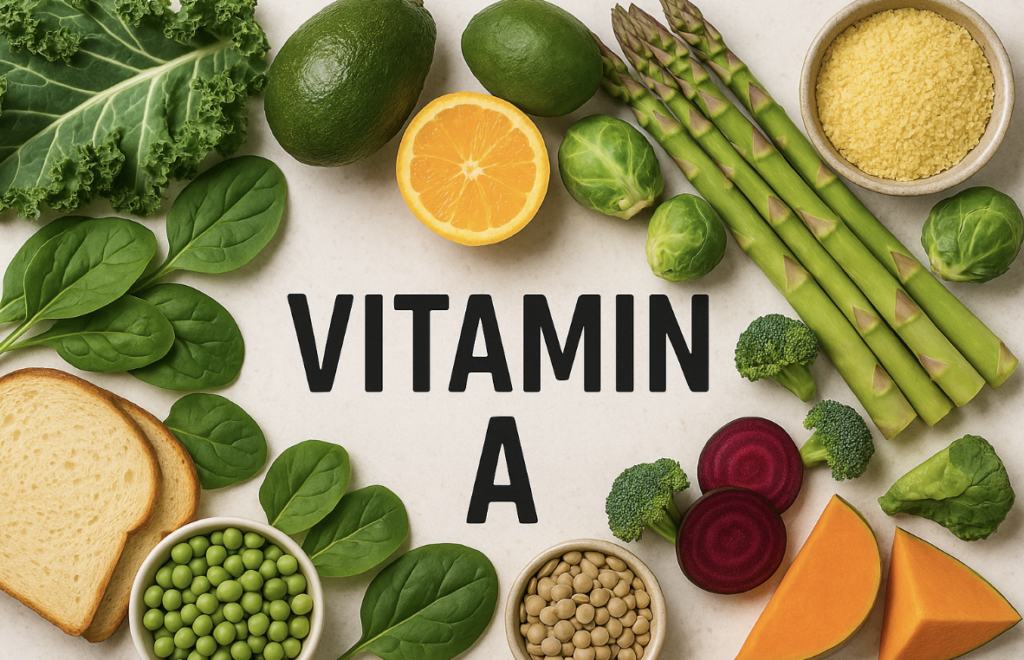
Vitamin A is an essential fat-soluble vitamin that plays a critical role in vision, immune defense, skin renewal, reproduction, and cellular health. It comes in two main forms—preformed vitamin A (from animal sources) and provitamin A (from plant-based beta-carotene). While deficiency is rare in developed countries, low intake may still affect immunity, eye health, and skin appearance. In this post, you’ll learn how vitamin A supports the body, what symptoms to watch for, and how to naturally maintain healthy levels through food or supplements.
What Does Vitamin A Do in the Body?

Vitamin A is stored in the liver and used to support a wide range of biological functions.
✔ Key Functions of Vitamin A:
- Maintains eye health and supports night vision
- Strengthens immune function and infection resistance
- Supports skin regeneration and wound healing
- Contributes to fetal growth and reproduction
- Aids in healthy cell development and differentiation
💡 Did You Know? Vitamin A helps produce rhodopsin, a pigment in the eye that’s essential for seeing in low light.
Top Health Benefits of Vitamin A

✔ 1. Protects Vision and Eye Health
Vitamin A reduces the risk of night blindness, age-related macular degeneration, and dry eyes.
✔ 2. Strengthens Immunity
Adequate vitamin A levels enhance the integrity of the skin and mucous membranes—your body’s first line of defense.
✔ 3. Promotes Healthy Skin
Retinoids (vitamin A derivatives) support collagen production and are widely used in acne and anti-aging skincare.
✔ 4. Supports Reproductive Health
Vitamin A is essential for sperm development in men and fetal development in women.
✔ 5. Acts as an Antioxidant (in Beta-Carotene Form)
Provitamin A carotenoids can help fight oxidative stress and protect cellular health.
Signs of Vitamin A Deficiency
⚠️ Common Symptoms:
- Dry or itchy eyes
- Night blindness
- Frequent infections (especially respiratory)
- Dry, rough skin or breakouts
- Delayed wound healing
- Stunted growth in children
💡 At-Risk Groups:
- People with fat-malabsorption disorders (e.g., celiac, Crohn’s)
- Pregnant women (especially in low-resource settings)
- Individuals with alcohol dependency or liver disease
- People on extremely low-fat diets
Top Food Sources of Vitamin A

🥩 Preformed Vitamin A (retinol, from animal foods):
- Liver (beef, chicken, cod liver oil)
- Eggs and dairy (cheese, milk, butter)
- Fortified foods (milk, margarine, cereals)
🥕 Provitamin A (beta-carotene, from plants):
- Carrots and sweet potatoes
- Pumpkin and butternut squash
- Kale, spinach, and collard greens
- Mangoes, cantaloupe, and red bell peppers
💡 Tip: Eat your vitamin A-rich veggies with healthy fats like olive oil or avocado to improve absorption.
Recommended Daily Intake (RDI)
- Adult men: 900 mcg RAE/day
- Adult women: 700 mcg RAE/day
- Pregnant women: 770 mcg/day
- Breastfeeding women: 1,300 mcg/day
💡 *RAE = Retinol Activity Equivalents, a measure that accounts for both preformed and provitamin A.
Vitamin A Supplement Considerations
💊 Forms Available:
- Retinyl palmitate or retinyl acetate (preformed)
- Beta-carotene (provitamin A, less likely to cause toxicity)
⚠️ Too Much Vitamin A?
- Chronic high intake (>3,000 mcg/day of preformed A) may cause liver damage, headaches, dizziness, and birth defects.
💡 Best Practice: Get vitamin A mostly from food; use supplements only under medical guidance if deficiency is diagnosed.
Pros and Cons of Vitamin A
✔ Pros:
- Supports vision, skin, immunity, and growth
- Available in both plant and animal sources
- Beta-carotene form has antioxidant benefits
⚠️ Cons:
- Toxic in excess (especially preformed A)
- Plant-based A (beta-carotene) is less bioavailable
- Deficiency can be hard to detect without testing
Vitamin A is a cornerstone of healthy vision, immunity, reproduction, and skin renewal. By focusing on colorful fruits and vegetables along with moderate animal-based sources, you can safely meet your vitamin A needs and avoid the risks of deficiency or excess. Always consult your doctor before using high-dose supplements, especially during pregnancy.
Read more on selenium and its antioxidant benefits
Learn more about vitamin A from the National Institutes of Health
